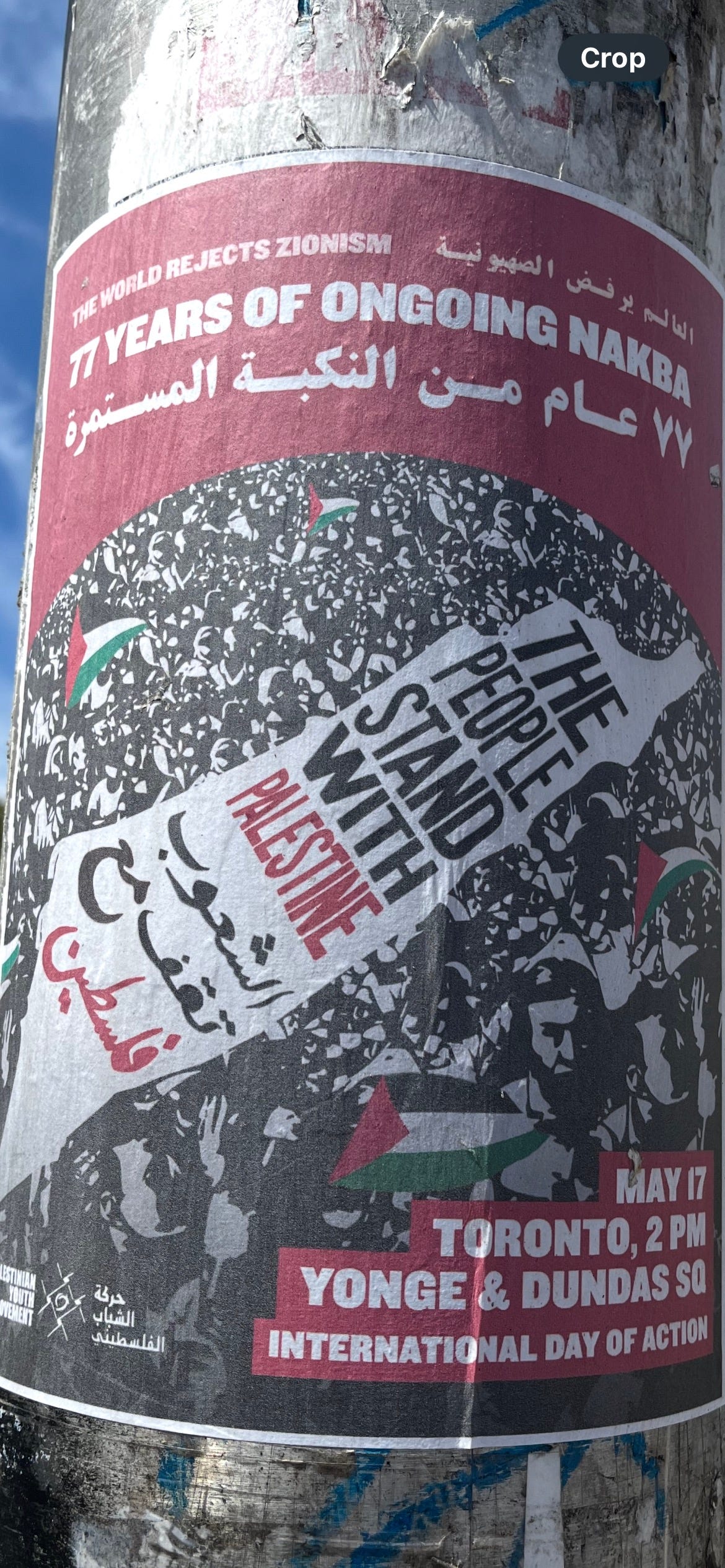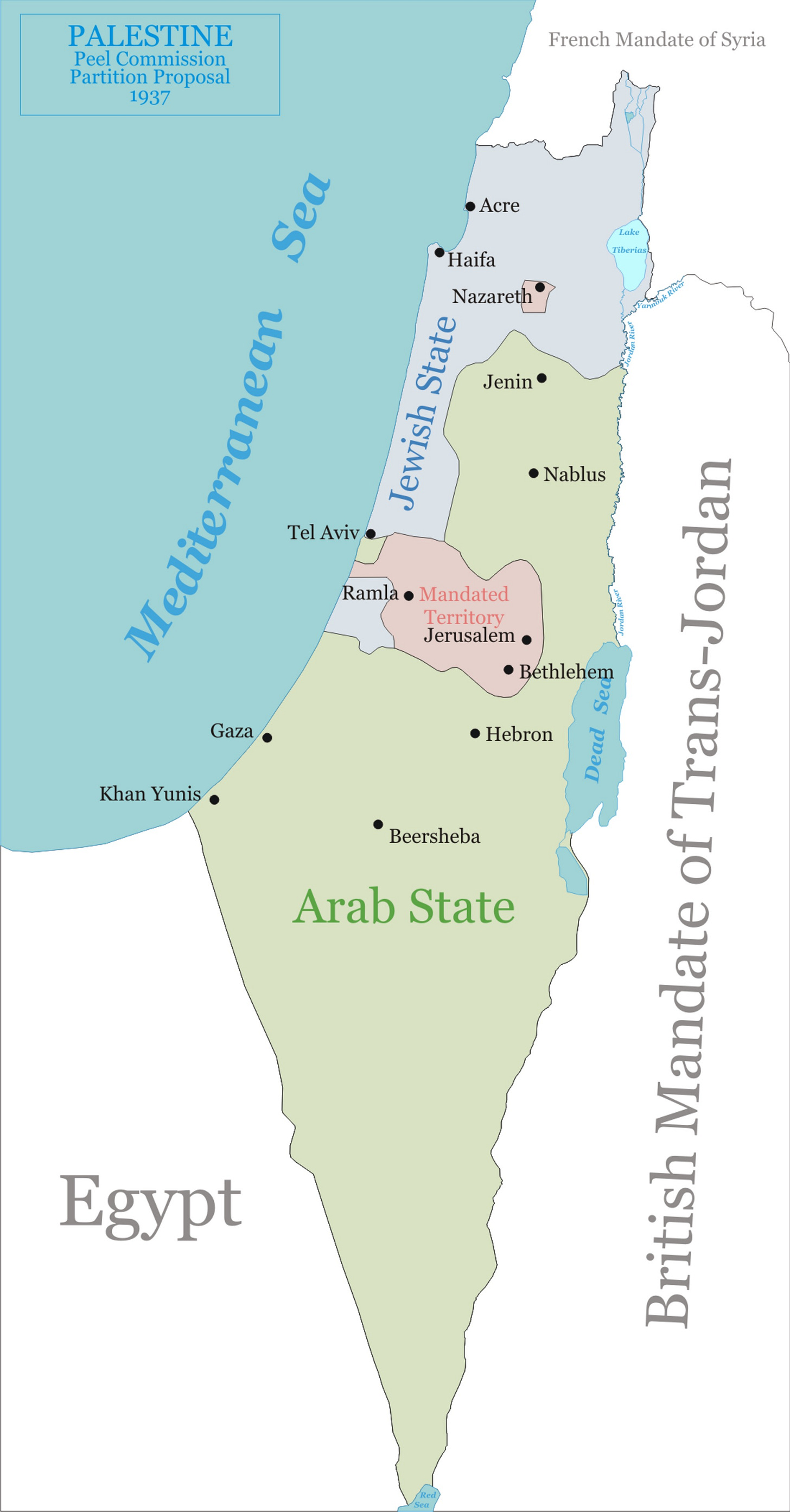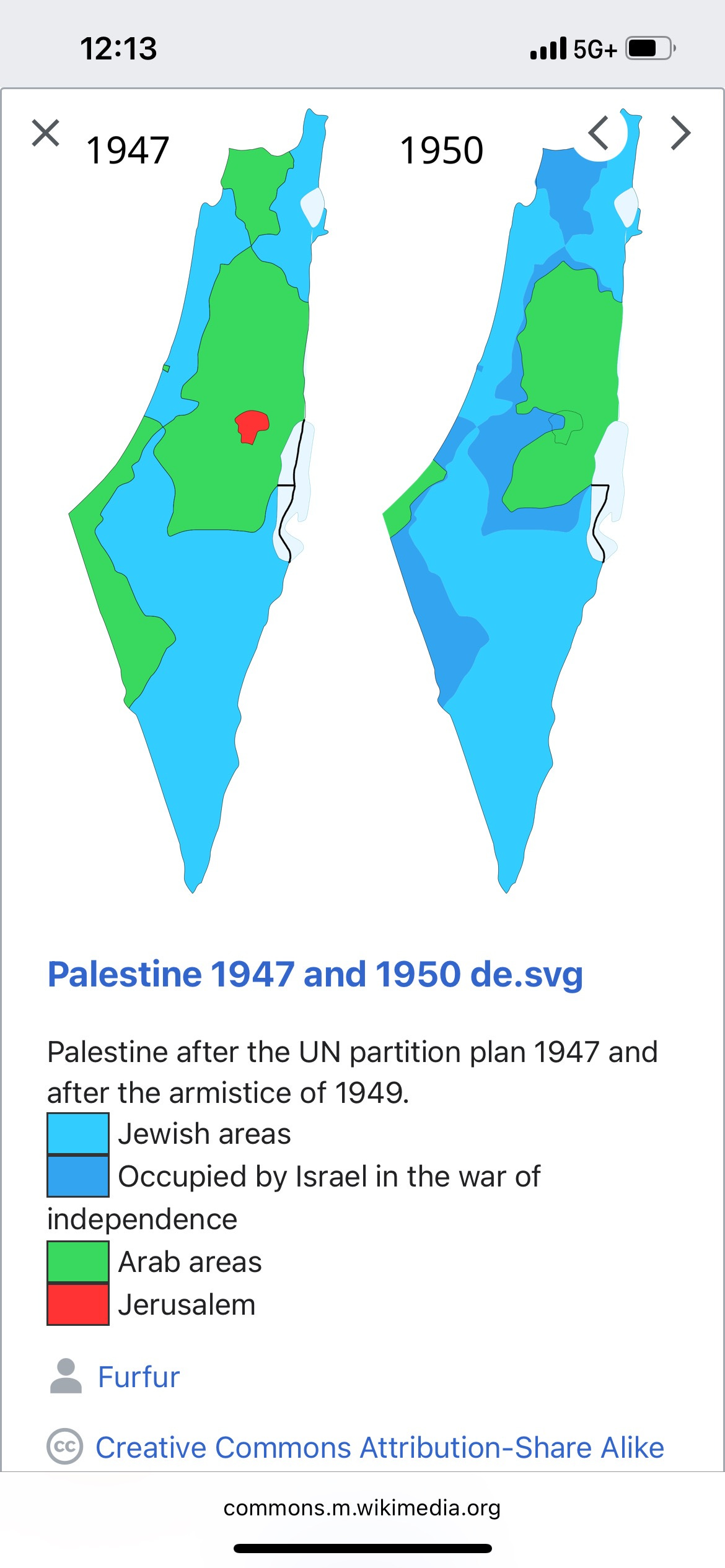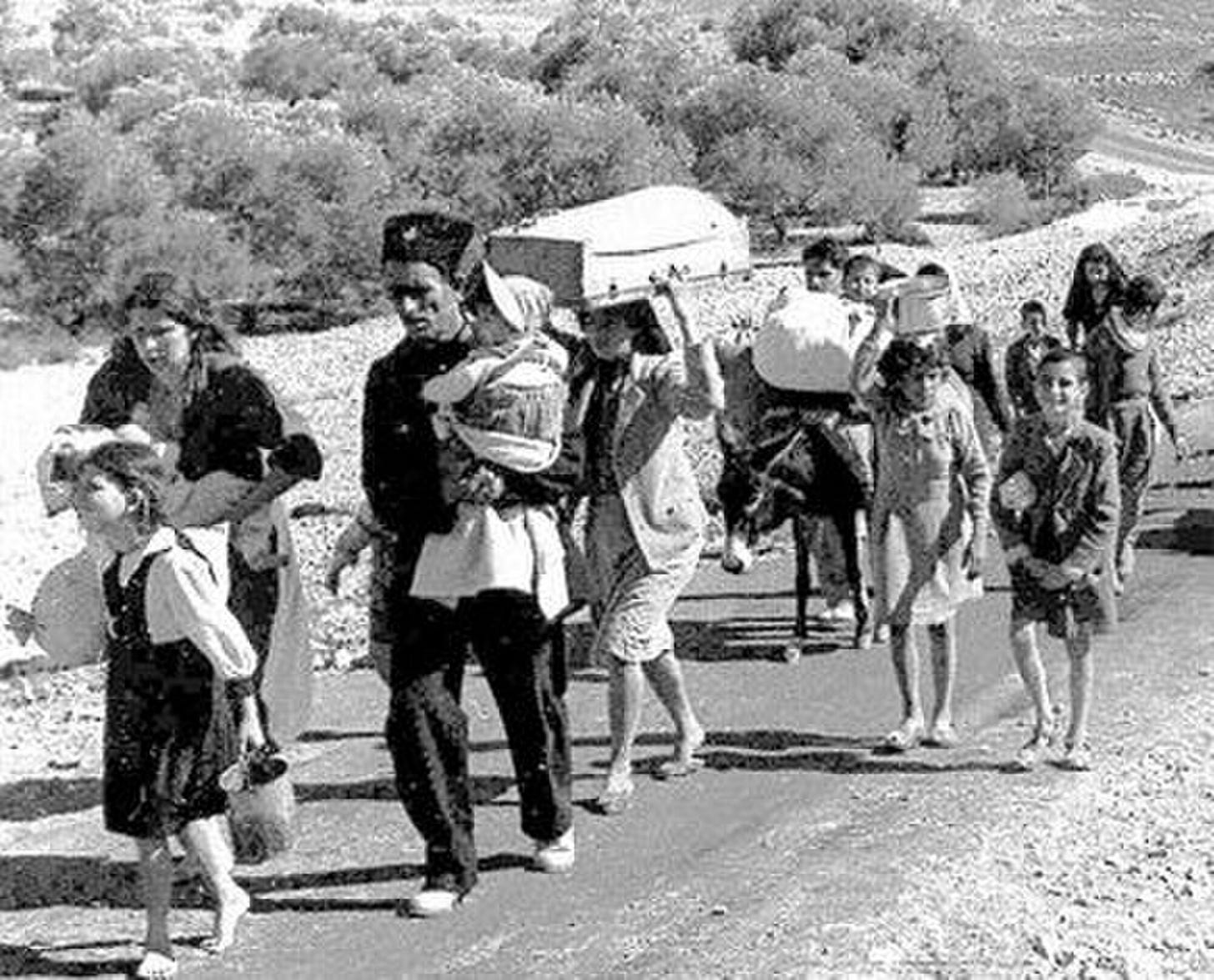My neighbourhood has been filled with posters advertising the “action day” to protest the ongoing Nakba.
Two different narratives describe events in the Middle East in 1948. Should we be grieving the Nakba or celebrating Israel’s independence? The story told to university students these days supports the Nakba. It is mostly but not entirely false. Countering the antisemitic narrative that underlies antizionism requires some knowledge of Jewish history and a recognition of the source of lies. I have tried to knit together multiple perspectives, but only those with credible evidence.
The Jews’ ancestral tie to the Levant is outlined in one of my earlier articles here, if you’d like more detail. The area was sparsely inhabited after the 1500 year old Jewish kingdom was decimated by the Roman conquest in 73 CE, killing a million Jews, taking 100,000 to Rome as slavers and renaming Judea as Syria-Palestina. It was ruled by one empire after another. With the Zionist movement, from the 1880s until the First World War, there was significant immigration into the area that would become the British Mandate of Palestine. A few wealthy Jews bought land from Ottoman landlords. It was then donated to the Jewish pioneers, returning to their indigenous land. There was no theft by the Jews, who paid exorbitant prices due to their desperation, fleeing pogroms.
Impoverished Jews from Eastern Europe and Czarist Russia brought prosperity to the Levant by draining swamps and planting orange groves. Although it may have appeared to be a land without people initially, there were Bedouin Arabs and tenant farmers with absentee Ottoman landlords. It was sparsely populated but not uninhabited.
The lies of history are more often lies of omission than commission. One of the biggest lies is that Jews immigrated by the thousands stealing land from Arabs. This is a lie of commission. Although there was Jewish immigration into the area that would become the British Mandate, there was far more Arab immigration from impoverished areas of the Ottoman Empire. Negating Arab immigration is the lie of omission. These surrounding areas would eventually become the countries of Transjordan, Lebanon, Egypt, Iraq and Syria.
The last colonial power, Britain, gave 78% of the land to the Arabs as Transjordan in 1921. Much of the Arab elite of the British Mandate, being heavily influenced by Nazism through the Grand Mufti, Haj Amin Al Husseini, refused all offers of peace, including the Peel commission of 1937, which would have given them almost 80% of the remaining Mandate.
This genocidal stance, refusing to live peacefully next to Jews, infused the culture that led to the violence and suffering of both Jews and Arabs in the Hebron massacre, the Arab revolt, and eventually the Nakba.
Britain had grown weary of controlling the Mandate where both Arabs and Jews wanted the colonial power gone. The Jews of Palestine were increasingly resentful of the British since they had blocked Jewish immigration into Palestine in their greatest hour of need. A genocide was brewing in Europe. The Iraqi Jews had been massacred in the Farhud, partly instigated by Haj Amin al Husseini in 1941. The Arab world was even less hospitable to Jews in the 1940s than it had been under the dhimmi rules of the Ottoman Empire. Before the creation of the state of Israel, the Middle East became increasingly hostile to Jews thanks to the Nazi propaganda skillfully directed at them.
After WWII, many of the young Jewish pioneers of the Yishuv (the pre-Israel Jewish settlement) had lost their entire families in the Holocaust, at a time that the British prevented their relatives’ immigration. In Europe, two years after the end of the Holocaust, Jews were still languishing in concentration camps which were repurposed as DP camps. The survivors who made it to Palestine were arrested and sent back to Germany or internment camps on Cyprus.
The British handed over Palestine to the newly created United Nations for a future Jewish homeland. In 1947 a partition was declared so that Jews and Arabs could live separately. This mimicked the partition of India into two states: Pakistan for Muslims and India for Hindus and all minorities. That partition occurred in the same year that Israel was created. At the time of Israel’s creation, local Arabs were offered 42% of the remaining land. Jews were to receive 55% but the vast majority was unusable desert of the Negev.
Rather than accept partition, Arab leaders chose to attack the tiny nascent state of Israel on May 14, 1948, the day Israel declared independence. Syria, Egypt, Lebanon and Iraq attacked a tiny impoverished new country. Saudi Arabia fought under the auspices of the Egyptian army and Jordan intervened to hold the areas proposed for the Arab state in the UN plan.
The Soviets, imagining that Israel would be their foothold in the Middle East as a communist country allied against the West, supported the Jews in this war. Almost every country had an arms embargo against Israel. The English continued to arm and train the Egyptians. The US and Europe imagined that the vastly outnumbered Jews would not survive. American pilots, both Jews and non-Jews who had fought in WWII and witnessed concentration camps, managed to smuggle surplus Nazi weapons via Czechoslovakia to the Haganah, the forerunner of the IDF.
Israel paid a very heavy price in the war for its independence, losing 1% of its population, but the country survived. The Arab armies lost the war they started and ended up with less than had been offered in the UN partition plan.In the 1980’s, the new Israeli “revisionist historians” re-examined their country’s history, as it had been taught from a Zionist perspective. Their leader, Benny Morris, was a far left wing Israeli academic but definitely not an antizionist. The same cannot be said for all members of that group. Benny Morris initially popularized the theory among left leaning Israelis that the Nakba was indeed true. Israel was guilty of a terrible crime.
Ilan Pappé , another Israeli revisionist historian, preferred lies of commission and eventually became a Marxist historian in Exeter, having alienated most of his colleagues at the University of Haifa. His legacy, besides popularizing BDS, is the complete fabrication of the massacre of Tantura. The fictional story was created by his grad student, Teddy Katz, who finally broke down and admitted his lie when successfully sued for libel by IDF veterans. Yet Tantura now has its own Wikipedia page as if it were true. The first 9 references on a Google search are from anti-Israeli sources that promote the lie.
The truth is that the war for Israeli independence was a brutal war with many battles and thousands of deaths on both sides. There were many massacres of Jews, although if you google it or rely on Wikipedia, you’d think only Jews were the aggressors.
There isn’t a single war in history that has no war crimes and this one is no exception. But the very rare crimes like Deir Yassin were hideously exaggerated, claiming hundreds of innocents killed, raped and babies cut out of their pregnant mothers. The truth was 61 were killed in battle and 23 murdered after they surrendered. There were no rapes nor babies murdered. It did not represent Israeli policy. Yet Deir Yassin has been used for decades to justify the slaughter of Israeli civilians. Israel’s error was in not correcting those lies. Rather, they used the lies to their imagined advantage, hoping to instill fear in local Arab villages, leading to their desertion.
The revisionist Israeli historians rejected the Zionist narrative that took no responsibility for Arab flight in 1948. The official Israeli stance placed all responsibility for the Palestinian refugee crisis firmly on Arab leadership for starting the war and instructing Arabs to leave the area, believing that the refugees would return victorious within a few days.
Benny Morris’s politics were far enough to the left that he refused to serve as an IDF soldier in the West Bank. He was sent to prison instead. Morris later served as an IDF reservist in Lebanon in 1982 and also as a reporter for the Jerusalem Post. In Lebanon, he met many Palestinian refugees. He heard about their exodus from Israel, including rare stories of their expulsion.
Upon his return to Israel, Morris began investigating IDF veterans, including getting access to secret reports of crimes that had been committed during the War of Independence. He approached his research with a defined point of view.
Edward Said consistently fabricated stories as a key spokesperson for the PLO. But he had the imprimatur of his Columbia University professorship, allowing him to spread his lies widely. His heir, Rashid Khalidi followed in his footsteps, both as a spokesperson for the PLO and a disseminator of pro-terrorist lies from a chair at Columbia University. His “Hundred Years War on Palestine” has too many falsehoods to elucidate all here, but he lies by denying the consistent aggression of Palestinian Arabs against Jews, both before and during the War of Independence. He completely glosses over the Nazi connection to the Palestinian movement. He erroneously states that the US supported Israel from its first days, ignoring the facts that the US had an arms embargo and even arrested the pilots supplying the Yishuv.
Benny Morris, the Israeli revisionist historian, eventually published a book in 1989 called “The Birth of the Palestinian Refugee Problem 1947 to 1949”. His unconscious error was to base his understanding of events on Israeli intelligence reports which reflected the rare war crimes rather than the major history of that period. Morris completely ignored Arabic written sources and all history of long-standing violent Arab aggression against Jews. He characterized an entire country by the history of its criminals rather than the majority of veterans.
However, the Zionist narrative’s refusal to recognize the suffering of Palestinians may have contributed to Morris’ flawed analysis of events. Traditional Zionists ignored the fact that Israel had an interest in many Palestinian Muslims leaving the land, hoping to ensure the Israeli founders’ ideal of a simultaneously democratic and Jewish state, where all minorities would enjoy equal rights. Israeli Jews were at war with both their Arab countrymen and neighbours. They shared a reasonable fear that an internal Arab fifth column could rise up and present an existential threat to the new country from within. Yet despite that fear, Israel had no internment camps like Canada and the U.S. had for the Japanese in WWII or the British for Germans. Nonetheless, Arab Israelis did live under martial law until 1966. Current critics of Israeli conduct at the time ignore the existential threat that Israel faced from within and without.
The suffering of Palestinians during the War of Independence and the resultant mass migration was real. But it was no different than the million Greeks expelled from Turkey in the 1920s, 14 million Germans expelled from Eastern Europe after WWII or the aforementioned Hindus and Muslims of India’s partition. Or the 800,000 Jews expelled from Arab lands at the time of Israeli independence, a forcible exile seldom mentioned.
Wars and the fall of empires often end with enormous movements of unfortunate people. Morris disregarded these contemporaneous migrations as empires fell and wars engulfed much of the world in the first half of the twentieth century. Most Palestinian Muslims found Israel to be inhospitable during the war. What is different is their neighbours’ refusal to incorporate those Palestinian refugees over successive generations. While the United Nations had an agency aimed at resettling all of the world’s refugees, UNHCR (the UN High Commission for Refugees), it created a unique stand-alone refugee agency, UNRWA (the UN Relief and Works Agency for Palestine), to assist only one group of refugees: Palestinians. Rather than resettle Palestinian refugees, UNWRA granted them and only them perpetual generational refugee status.
The descendants of the 156,000 Arabs who remained in Israel enjoy far more rights than the vast majority of Arabs in any other surrounding countries. Approximately 650,000 Arabs fled from Israel, becoming refugees; mainly in Jordan, Egypt, Syria, Lebanon and Iraq. They fled for the same reasons that most flee a war zone, avoiding danger and deprivation.
Initially, Morris’ book was largely ignored in Israel. But it was hailed in reviews in the New York Times and Washington Post since it adhered to their left-wing views of Israel as the aggressor. Some 15 years later, Morris’ beliefs shifted; recognizing repeated Arab rejection of peace. He became far more critical of the Palestinians, identifying his error about the cause of Palestinian suffering during the War of Independence. He finally recognized that it was Arab armies who initiated the 1948 war and posed an existential threat to the fledgling Israeli state.
There is still some debate over the extent to which Arabs in what is now Israel were encouraged by their leadership to leave. They were told that the Jews would be decimated within days of the start of the war. While the war finally ended with the Arab defeat and Israel’s survival, Jordan had conquered and annexed Judaea and Samaria, including the old city of Jerusalem. They then renamed the area the West Bank (i.e. of the Jordan River). The Jordanians’ first act following annexation was the ethnic cleansing of all Jews from the area. Almost all the medieval synagogues of the old city were destroyed. For the first time in 3000 years, Jews were not allowed to visit East Jerusalem, site of the Jewish quarter, the western wall or the Mount of Olives. They were barred from entering Hadassah Hospital, with its beautiful Chagall windows, on the Hebrew University Campus.
The Cave of the Patriarchs, where the Ottomans refused admission to the Jews, limiting them to the first seven steps leading to the structure, was now entirely off-limits. Egypt controlled the Gaza strip and similarly removed all of its Jews. Jews were banished from all of those areas until the Six Day War.
The term, Nakba, meaning the “catastrophe” in Arabic, was coined by Constantin Zurayk, a Syrian scholar. It was used to describe the incompetence of the Arab armies which lost to Israel. Until the 1980s the Nakba, commemorated the shame and incompetence which led to Arab defeat at the hands of the pathetic Israelis. In the 1980’s the term was repurposed to symbolize Palestinian victimhood in the face of purported Israeli aggression and colonialism. The fact that Palestinians could have been celebrating their own day of independence but chose war instead is entirely denied in the commemoration of the Nakba. The sole Jewish majority country, the only Hebrew speaking nation in the world is painted as an aggressive colonizer even though it stands alone among 22 Arab countries.
In contrast, to Arab rejectionism, the Druze leader of Mandatory Palestine, Sheikh Amin Tarif , initially chose to remain neutral regarding the nascent Jewish state. But by 1949 he had aligned himself with Israel. Tarif was not originally a Zionist. But he recognized that the Jews would offer his small minority group greater protection than their Arab neighbours. That two-way relationship has been extremely rewarding for both communities. The Druze thrive in Israel. Their officers are among the most successful in the IDF. They even serve in the IDF at a higher rate than any other group in Israel, including Jews.
If only the Palestinian Muslims had the same visionary leadership as the Druze. Egypt and Jordan never offered the Palestinians a state in the 19 years they held on to the territory of the British Mandate, namely Gaza and the West Bank. Like every other neighbouring Arab country, they cynically treated Palestinians who came to them for refuge as second class citizens, while proclaiming their support for the Palestinian cause.
Israel’s war of independence was violent, brutal, costly and most of all, unnecessary. Had the Arab inhabitants of Palestine accepted partition in 1948, they too would be celebrating 77 years of statehood. Instead, they commemorate an unnecessary Nakba, hoping against hope to fulfill a 77 year old dream of destroying Israel. If only they chose peace rather than war.









Excellent piece!
I am impressed with your review of the complicated history. However, the fact remains that the "Arab" side does not want "Jews" to exist in the "Holy Land". Can this ever change? I pray that someday it can happen and that "peace" can exist? In the meantime there is suffering on both sides. However, It is not all Israel's fault!